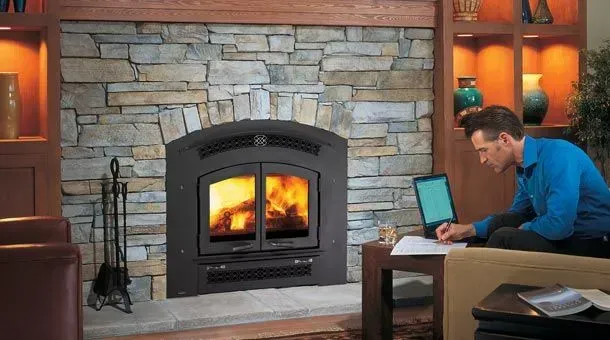
Tips For Buying A Home With A Fireplace
“If you are a first time fireplace owner, or a veteran looking to make a move, you are going to need some help checking out that new fireplace. This article will help you arm yourself with information that will help you figure out if that new fireplace is going to be your favorite feature of the house, or a complete nightmare.”
Many prospective home buyers love the idea of a warm crackling fireplace and will often pay up to $10,000 more for a home with a fireplace. Fireplaces convey a sense of luxury, sophistication and a cozy and inviting ambiance. Fireplaces continue to be one of the most sought after amenities of a home. In fact, a recent survey of realtors indicated that the number 1 mentioned feature of a home listing was a fireplace.
If you are a first-time fireplace owner, or a veteran looking to make a move, you are going to need some help checking out that new fireplace. This article will help you arm yourself with information that will help you figure out if that new fireplace is going to be your favorite feature of the house or a complete nightmare
Note : We will always recommend that a certified chimney sweep inspect the chimney for any issues. Even following all the tips below, you are still at risk if you do not get your chimney inspected by a certified professional.
“don’t count on your home inspector to be a certified chimney specialist”
Before getting started, you might think to yourself “Wait, won’t the home inspector cover this?” – While a home inspector may use the same tips below to quickly scan for any obvious issues, don’t count on your home inspector to be a certified chimney specialist. In fact, many home inspectors in the Cincinnati area have Chimney Works on speed dial for just this reason. Anyways, on to the tips!
Consider Usage
It is important to give some thought to what you expect to use your fireplace for. Some folks will only light a fire during the holidays, or for the occasional romantic evening in. Other folks are looking to offset a heating bill or prepare for a potential power outage. There are also a small number of folks who want to heat exclusively with their fireplace.
Knowing how you will use the fireplace will become important when we review what type of fireplace is in the new home you are considering buying.
Inspect The Inside
Is this an open masonry fireplace – that is: Is there an insert or fireplace glass covering the opening? If not, you are going to find that 90% of the heat produced is going to go up the chimney. It’s not uncommon for us to hear folks coming and explaining that it’s actually colder when they light a fire. Plus, open fireplaces tend to be drafty, especially in older homes.
Check The Damper
On an open masonry fireplace, the damper is the part of the fireplace that can close or open to let the smoke out. Dampers tend to have a knob or lever just over the fireplace opening. Dampers should open and close when you turn the knob. Give the damper a try and see if it opens and closes, if not, you may need to have your damper fixed.
Gas Log Sets
Gas Log sets are ceramic ‘fake logs’ that sit in many open gas fireplaces. Gas logs are really more decorative than anything, meant to simulate a real wood fire. The gas logs make the flames look fuller.
Fireplace Inserts

Fireplace Inserts change your drafty fireplace into an efficient heating machine.
Inserts turn your fireplace into a high-efficiency wood stove. If you see an insert in the fireplace, find out what type.
Wood Inserts
Wood Inserts let you burn firewood to heat your home. Read more about Wood Inserts in our Buyer’s Guide.
Gas Inserts
Gas inserts use natural gas to heat your home. Read more about Gas Inserts in our Buyer’s Guide.
Pellet Inserts
Pellet Stoves let you burn compressed pellets made of wood. Read more about Pellet Stoves in our Buyer’s Guide.
Fuel Costs
Now that you know what type of insert you may have, you need to consider fuel costs. Whether you are using wood, pellets or natural gas as fuel, you are going to spend some money, or at least time. If you have access to cheap or free firewood, a wood-burning insert may be beneficial. Otherwise, you will need to review the cost of pellets or natural gas in your area.
Water Damage
Chimneys can sometimes leak. Check around the fireplace to see if you see any water spots where water may be coming in. These often appear as discoloration on the ceiling near the chimney on the inside of the home. If you see water damage, find out if the leak was repaired or not.
Inspect The Outside
Now that you have a good feel for the inside of the fireplace, check the outside.
Let’s look at this from the top down.
Chimney Cap
At the very top of the chimney, there should be a cap. The cap acts like a roof for your chimney, keeping critters and rain out. If the cap is missing, its not just the cost of replacing the cap you have to be concerned with. If a chimney has had a missing cap for a while, the weather may have damaged the inside of your chimney.
Chimney Crown
The crown is the concrete top of a chimney. These are typically sloped so that rain rolls off them. Cracks in this crown can let water in, so make sure there are no visible cracks and that pieces of the crown are not broken off.
The Chimney
Examine the rest of the chimney. Look for an unnatural lean to the chimney, missing or broken bricks, and chipping or missing mortar (between the bricks) . All of these problems can result in either water penetration or a safety issue.
Summary
It’s always a good idea to ask for a demonstration of the fireplace. Many realtors may already have it lit when you enter for a showing. These tips will certainly help you identify any obvious problems, just remember that a certified chimney sweep will be able to check the places you can’t see from the ground.
Stay Safe & Keep Warm

